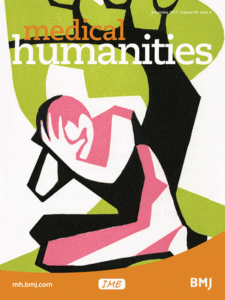Luna Dolezal and Barry Lyons introduce their special journal issue on Shame, Stigma and Medicine

Shame as a research topic is enormously compelling. Everyone has experienced the pain of shame and, in some way, been shaped by that experience. Not only that, shame reveals what is most personal to us, our hopes and aspirations, while at the same time viscerally showing us the importance of our ties to others, how painful it is when our feelings of connection, acceptance and belonging are threatened.
We started talking about shame and its significance in healthcare and medicine several years ago while we were both based at Trinity College Dublin. Luna, a philosophy academic, had written her PhD thesis on body shame and had considered cosmetic surgery as a case study to discuss how the body can be literally ‘shaped’ by shame. Part of this research led Luna to become really interested in the use of shame and humiliation spectacles in medical and ‘medicalized’ reality television. At the same time, Barry, a bioethicist and practicing anaesthetist, was thinking about shame in relation to clinicians’ experience of medical failure and the shaming culture that pervades the regulatory framing of clinical practice. What we realized through our conversations is that although shame is a significant and powerful force in medicine and healthcare, seemingly having consequences for everyone involved—from patients, to medical students, to clinicians, to other healthcare professionals, while also pervading institutional culture—very few people are talking about shame and its effects. And even more surprisingly, there seems to be very little sustained theoretical or empirical research on the topic.
Once we started thinking about and researching shame in medicine, we realized how significant the topic was – and how far-reaching the consequences for understanding shame dynamics could be. The secrecy and silence around shame, and its impact in medicine, have the potential to cause significant harm. Shame seems to be implicated in multiple issues, such as: health outcomes (who gets sick and why); burn out and stress for clinicians (which seems to be a contemporary problem of epidemic proportions); the training of medical students and their enculturation into medical practice; the current emphasis on individual responsibility in health; and how individuals experience their illnesses; and the power relations inherent in clinical encounters.
Shedding light on shame in healthcare seemed, to both of us, of utmost importance, and putting together a Special Issue of Medical Humanities on the topic of ‘Shame, Stigma and Medicine’ was an exciting opportunity to bring together a diverse and multi-disciplinary group of scholars to reflect on the subject. The result is an issue that demonstrates the complex, multi-faceted and far-reaching scope of shame in medicine. While diverse in nature, the papers in the issue collectively demonstrate that shame has a vital yet frequently unheeded relationship with bodies, minds and medicine, an association that is often damaging. While there are so many rich insights to be gleaned from this collection of articles, what is evident is that there is so much more to say—that we are only beginning to scratch the surface.